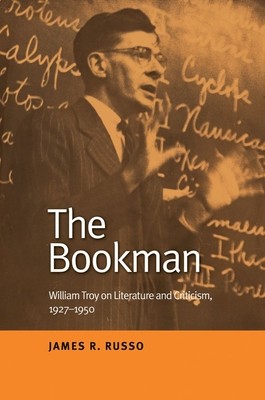
- We will send in 10–14 business days.
- Author: James R Russo
- Publisher: Liverpool University Press
- ISBN-10: 1789761727
- ISBN-13: 9781789761726
- Format: 15.4 x 22.9 x 1.3 cm, minkšti viršeliai
- Language: English
- SAVE -10% with code: EXTRA
Reviews
Description
William Troy (1903-1961) was a highly regarded literary critic during the 1930s and 1940s. Among his contemporaries, he ranked with Edmund Wilson, Kenneth Burke, and F. O. Matthiessen. Indeed, in the preface to the posthumous, 1968 publication of his Selected Essays, which won a National Book Award, Allen Tate placed Troy among the handful of the best critics of this century. Troy's criticism was informed by an intelligence so balanced that, where many theoreticians took up positions in logical traps, he easily avoided them. At the very moment when scholars and critics were either treating literature like polemics or investigating ideas as if belles-lettres were a sub-category of history or philosophy, Troy acknowledged both the centrality of literary ideas and their distinction from ideas in other forms. When confronted with a text, he analysed it with a firm sense of its inherent meaning and of its cultural implications, in a style that expresses seriousness of commitment
precisely and clearly. Th
EXTRA 10 % discount with code: EXTRA
The promotion ends in 21d.21:35:20
The discount code is valid when purchasing from 10 €. Discounts do not stack.
- Author: James R Russo
- Publisher: Liverpool University Press
- ISBN-10: 1789761727
- ISBN-13: 9781789761726
- Format: 15.4 x 22.9 x 1.3 cm, minkšti viršeliai
- Language: English English
William Troy (1903-1961) was a highly regarded literary critic during the 1930s and 1940s. Among his contemporaries, he ranked with Edmund Wilson, Kenneth Burke, and F. O. Matthiessen. Indeed, in the preface to the posthumous, 1968 publication of his Selected Essays, which won a National Book Award, Allen Tate placed Troy among the handful of the best critics of this century. Troy's criticism was informed by an intelligence so balanced that, where many theoreticians took up positions in logical traps, he easily avoided them. At the very moment when scholars and critics were either treating literature like polemics or investigating ideas as if belles-lettres were a sub-category of history or philosophy, Troy acknowledged both the centrality of literary ideas and their distinction from ideas in other forms. When confronted with a text, he analysed it with a firm sense of its inherent meaning and of its cultural implications, in a style that expresses seriousness of commitment
precisely and clearly. Th


Reviews